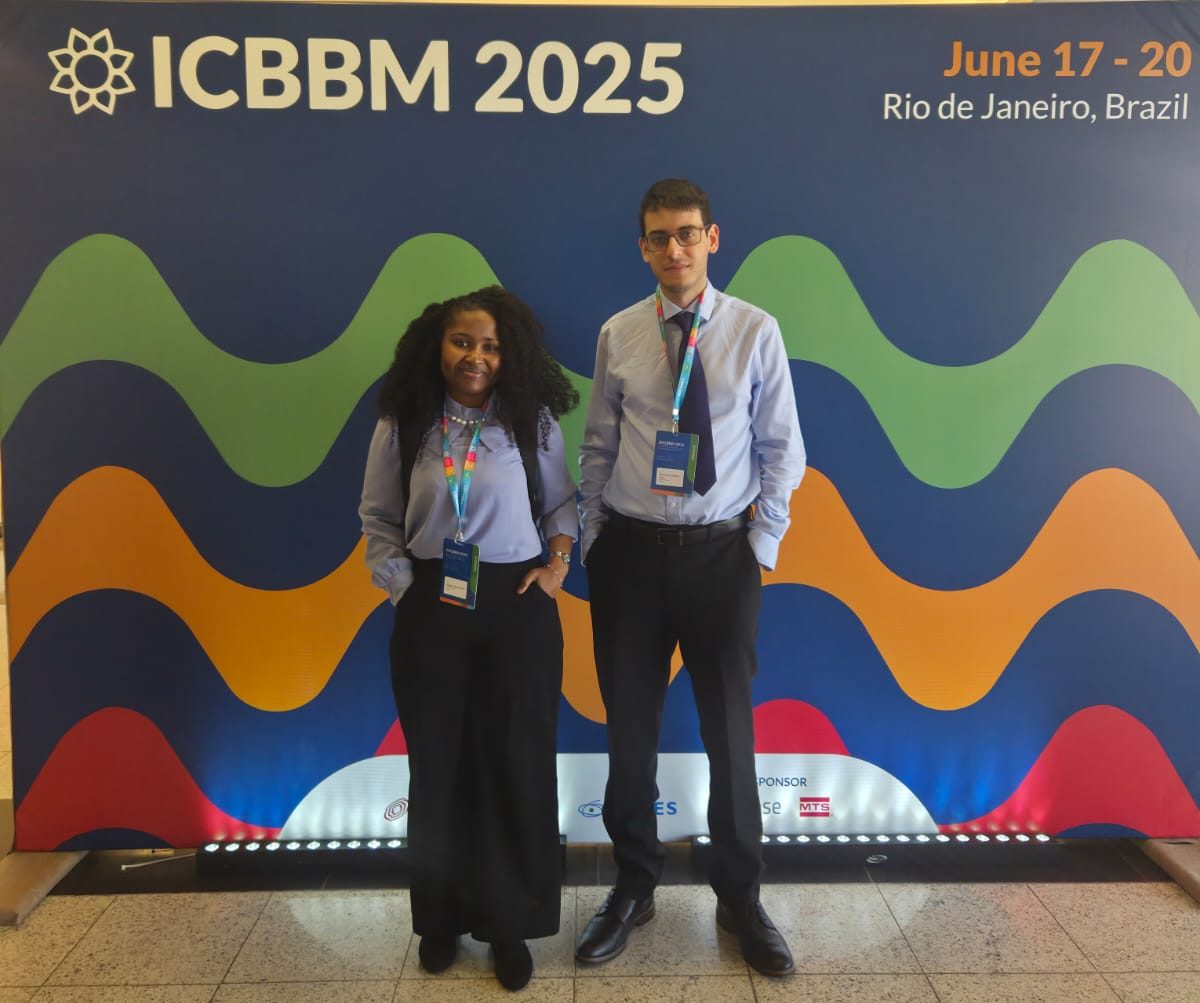International Impact of João Vítor Felippe Silva and Alima Carlos Averu at ICBBM 2025!
Two members of the CRMR, João Vítor Felippe Silva (postdoctoral fellow) and Alima Carlos Averu (PhD student in wood engineering and bio-based materials), both supervised by Professor Pierre Blanchet, proudly showcased our centre’s expertise at the 6th edition of the ICBBM (International Conference on Bio-Based Building Materials), held from June 17 to 20, 2025, in Copacabana (Rio de Janeiro, Brazil).
This leading international conference brings together experts from around the world to discuss key issues related to bio-based materials in construction. The participation of João and Alima is a testament to the international reach and impact of our expertise.
João Vítor Felippe Silva delivered an oral presentation titled « Delamination Performance of Glulam Beams Made of Northern Hardwood Species », based on a project initiated in 2024 at the CRMR. His research focuses on enhancing the use of hardwood species in the manufacturing of glued laminated timber (glulam), showing that some local hardwoods, when combined with commercially available adhesives widely used for softwoods, demonstrate strong potential for the sustainable construction industry.
The expertise developed in hardwood valorization holds global relevance, with the potential to be applied in many countries with similar forest resources, thereby contributing to sustainable and locally adapted building solutions.
Supported by the CRMR’s Student Mobility Program, João’s participation in this international conference provided him with a valuable opportunity for scientific development, while showcasing both the excellence of his institution and the relevance of his research.
Alima Carlos Averu, for her part, presented her research through both an oral communication and a scientific poster, titled « Analysis of Physical and Mechanical Properties of Structural Hemp-Concrete Composites ». Her project is part of a broader effort to develop innovative and sustainable materials based on hemp, actively contributing to the green transition in the construction sector, both in Quebec and internationally.
Congratulations to João and Alima for their outstanding participation in this internationally renowned conference and for the excellence of the research they presented.

Title and Abstract of João Vítor Felippe Silva’s Research Project: Performance de délaminage des poutres lamellées-collées fabriquées à partir d’essences feuillues du Nord
Canada boasts several hardwood species that have potential for use in construction as bio-based engineered structural elements. However, a significant challenge lies in addressing their bonding properties, which are influenced by the complex anatomical structure and variable characteristics of hardwoods compared to softwoods. This study examined the bonding performance of glued laminated timber (glulam) manufactured from four Canadian hardwood species—Aspen, Beech, Maple, and Ash—using three structural adhesives: Polyurethane (PUR), Emulsion Polymer Isocyanate (EPI), and Polyvinyl Acetate (PVAc). Bonding quality was evaluated through delamination tests, according to Canadian standard. Aspen and Beech bonded with PUR and EPI exhibited satisfactory low delamination, demonstrating their suitability for glulam applications. However, the absence of surface priming in PVAc-bonded specimens significantly impaired performance, leading to higher delamination rates. EPI-bonded Ash failed to meet delamination standards due to its ring-porous anatomy hindering uniform adhesive penetration. The findings underscore the critical role of surface preparation, adhesive selection, and tailored testing protocols to optimize hardwood glulam production. Recommendations for future research include the exploration of innovative surface priming techniques and environmentally sustainable adhesive solutions to enhance bonding performance.
Title and Abstract of Alima Carlos Averu’s Research Project: Analyse des propriétés physiques et mécaniques des composites structurels en béton de chanvre
The incorporation of renewable bio-based materials as aggregates in concrete has emerged as a significant approach to producing building materials with superior thermal, acoustic, and environmentally friendly insulation proper-ties. However, such materials often contribute to reduced mechanical perfor-mance in the resulting concrete. This study aimed to identify a composition of concrete containing bio-based materials that is suitable for manufacturing struc-tural construction materials. The research involved three different mixtures: con-ventional concrete (comprising Portland cement, sand, stone dust, gravel, and water) and two variations of hemp concrete. In the hemp concrete mixtures, min-eral aggregates were partially replaced with hemp shiv at proportions of 10% and 5%, relative to the cement’s weight. After undergoing oven curing and air curing for 7 and 14 days, respectively, the physical and mechanical properties of the samples were assessed. The results showed densities ranging from 1805 to 2278 kg/m³, water absorption rates of 3.3% to 3.9%, open porosity values between 0.048 and 0.245, and compressive strengths varying from 1.8 to 14.0 MPa. Based on these findings, the concrete samples containing 5% hemp demonstrated supe-rior performance in this study. Moreover, the outcomes were consistently better compared to those reported in similar studies found in existing literature.

